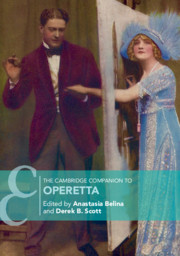Book contents
- The Cambridge Companion to Operetta
- Cambridge Companions to Music
- The Cambridge Companion to Operetta
- Copyright page
- Contents
- Illustrations
- Tables
- Music Examples
- Notes on Contributors
- Chronology, 1855–1950
- Introduction
- Part I Early Centres of Operetta
- Part II The Global Expansion of Operetta
- 6 Going Global: The International Spread of Viennese Silver-Age Operetta
- 7 Spain and Zarzuela
- 8 Camping along the American Operetta Divide (on the Road to the Musical Play)
- 9 Operetta in Russia and the USSR
- 10 Operetta in the Nordic Countries (1850–1970)
- 11 Operetta in Greece
- Part III Operetta since 1900
- Select Bibliography
- Index
- References
8 - Camping along the American Operetta Divide (on the Road to the Musical Play)
from Part II - The Global Expansion of Operetta
Published online by Cambridge University Press: 14 November 2019
- The Cambridge Companion to Operetta
- Cambridge Companions to Music
- The Cambridge Companion to Operetta
- Copyright page
- Contents
- Illustrations
- Tables
- Music Examples
- Notes on Contributors
- Chronology, 1855–1950
- Introduction
- Part I Early Centres of Operetta
- Part II The Global Expansion of Operetta
- 6 Going Global: The International Spread of Viennese Silver-Age Operetta
- 7 Spain and Zarzuela
- 8 Camping along the American Operetta Divide (on the Road to the Musical Play)
- 9 Operetta in Russia and the USSR
- 10 Operetta in the Nordic Countries (1850–1970)
- 11 Operetta in Greece
- Part III Operetta since 1900
- Select Bibliography
- Index
- References
Summary
Four prominent ‘origin stories’ for the American musical intertwine with the history of American operetta, which bifurcated, through the American legacies of Gilbert and Sullivan (including Cohan’s musical comedies) and The Merry Widow, into two distinct types: fast-paced musical comedies with an American profile, and the more romantically tinged, Viennese-derived American operetta. In balancing elements of these types, the American musical stage fostered camp reception modes, overtly emergent especially in Naughty Marietta, but becoming more closeted in the 1920s, when the two types again reached an extreme point of separation, with Gershwin’s and other musical comedies on one side of the divide, and Romberg’s and Friml’s hit operettas (along with Deep River), on the other, with operetta (or the ‘musical play’) bolstered by Hammerstein’s rhetoric laying claim to the higher aesthetic ground. Show Boat marked a probably deliberate attempt to remix and fuse the two types in a hybrid form that eventually stabilized in the wake of Oklahoma! Throughout, the element of camp, often passing as unintentional, governed the negotiations between the two types, allowing them to coexist in the musical play as it (re)emerged in the 1940s.
Keywords
- Type
- Chapter
- Information
- The Cambridge Companion to Operetta , pp. 120 - 134Publisher: Cambridge University PressPrint publication year: 2019



